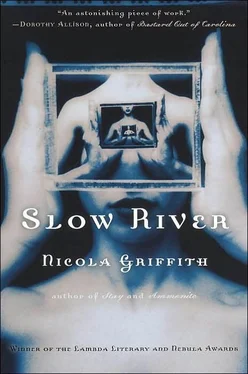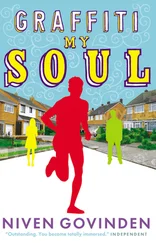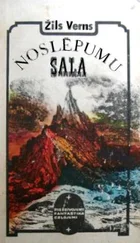An old man was dragging a small shopping cart into my doorway. I had seen him before. He lived on the third or fourth floor. The cart looked heavy.
“Can I help you with that?”
He looked at me. His cheeks were sunken and his eyes filmy but his voice was robust. “Bird, isn’t it? Sal Bird?” I nodded. He thought for a moment. “Fifth floor,” he said, evidently satisfied with his knowledge.
I looked at the nameplates in neat rows by the ancient intercom. I had no idea which was his. He laughed at my expression.
“Tom Wilson, third floor. And yes, I’d count it a great favor if you’d help a tired old man with his groceries.”
His suit jacket hung from broad shoulders; he would have been a big man thirty years ago. I wondered what it must be like to get old.
I balanced my sack on top of his groceries, and he talked as I humped the cart, one tread at a time, up the three flights of stairs. “What have you got in here?”
The look on his face was interesting: unsure whether or not it was polite to be offended at this invasion of privacy by a Good Samaritan. In the end, he grinned and said slyly, “That’s for me to know and you to find out.”
I smiled wryly. He was right. I shouldn’t have asked. “It’s heavy, whatever it is.”
“Do you good;” He held open a door for me and I pulled the cart gratefully onto the landing.
“Can you manage from here?”
“Didn’t think you had to set off for your job for hours yet.” That sly grin again. “I thought you might like to share a cup of tea with a lonely old man.”
I couldn’t think of any reason to refuse him, so I followed him into his flat.
It was bigger than mine, and cozy, filled with Scandinavian furniture, the blond wood and gray-nubbed fabrics of twenty or thirty years ago. Everything was very clean. He watched me take it all in. “Nicer than that tomb of a room the landlord gave you upstairs. Warmer too. How strong do you like it?”
“What?”
“Your tea. I’m partial to strong tea myself.”
“Oh. Whatever you’re having.”
“You won’t ever get what you want unless you know. And unless you tell those who ask. I’ll ask you again: How do you like your tea?”
I closed my eyes, thought back to other times. “Lapsang souchong, no milk, no sugar, no lemon, three heaped teaspoons in a pot big enough for two. And hot, not luke-warm. Served in bone china—the old kind, wafer thin, so you can see the color of the tea through the white—with a silver spoon. Steel spoils the taste.” I opened my eyes. “Well, you asked.”
“I did, I did. And thank you for sharing that with me.” He nodded at me seriously, and disappeared into the kitchen.
He brought out a tray and took it over to the table by the window: two pots, two cups. One of the cups was Wedgwood. It had a tiny chip on the rim. He took it over to the table by the window which, unlike mine, looked out onto the street. “For you,” he said, handing me the Wedgewood cup, and pointing to one of the pots. “Right out of Lapsang souchong and silver teaspoons. But I found some Earl Grey.” I poured for both of us. My tea was that lovely light brown gray of undyed fine tea. His looked like treacle.
He sipped and smacked his lips. “Strong enough to stand a spoon up in.”
I sipped mine. It was delicate and deliciously hot. I smiled and nodded. “Very nice.”
“A simple pleasure, tea. Doesn’t matter how rich or poor a person might be, good tea is good tea.” He looked at me over the rim of his cup. His eyes were gray as a winter sea.
“Lot of simple pleasures are very important. Take that window, now. I can sit by it when I’m too stiff to get up and down the stairs, and watch the world. I know every one of the tenants in this building by sight. I know what time they go to work, or not, as the case may be. I know who visits them, and for how long.”
I know you’re lonely, he seemed to be saying. I am, too. If you talk to me I won’t pry for more, and I won’t tell anyone else. I didn’t say anything.
“For example, I know that Mr. Rachmindi is moving out next month. His place is nicer than yours, and not much more a month.”
“I’m happy where I am.”
“Maybe you are, but think about the weather as the winter gets on. You’ll be mewling with cold come January. And his window looks out onto the trees at the back, if that’s what you’ll miss.”
“It’s not that.” He just waited. “It’s…” I stood up, found my sack of bulbs, brought them back. I rolled one onto my palm. “Jonquil. In April that’ll be a flower the color of hot sun on white sand.” I put it on the table and took out another. “Bluebell. Like soft babies’ eyes. Freesias, violets, crocuses, verbena…” They rolled out of the sack like toy trucks. “I took my flat because I can get onto the roof. I’m going to grow these.” Where the squirrels could not get at them. “It will be a place of wild things, natural things. I need them.” A tear dripped onto the lacy brown and beige wrinkles of the bulb in my palm.
Tom Wilson’s papery hands reached out and folded my fingers over the bulb. “Best keep it dry,” he said, and produced a large white handkerchief from somewhere. He watched silently as I wiped my face, then my nose, and put the bulbs back into the bag.
“This garden of yours… Will you invite me up to see it, when it starts to bloom?”
I opened my mouth to say, I’d love to, but you will you get your old bones out onto the roof? and said, instead, “Yes.” If he wanted to see the flowers, we’d find a way.
I spent two hours with Tom Wilson and afterward climbed the stairs to my flat thoughtfully.
When I got in I called Spanner. She answered immediately. “Did you get those changes made on my PIDA?”
“Last night.”
“All of it?” I needed to feel safe from Magyar.
“Everything. You are now a fully three-dimensional paragon of virtue.” She was still in that expansive, good mood. “I was tempted to add a police record, something along the lines of swimming naked in the docks as a protest for, oh, animal rights or something.” She grinned. “But I decided against it.”
I couldn’t help it—I grinned back. She could be so charming when she wanted. “I’m glad to hear it.” Even more glad to hear that the work was done. Now Magyar could check all she liked.
“About that equipment,” she said. “You available late tonight for a meeting? Good. I’ll see you here after work.”
The screen went blank.
* * *
The morning of Spanner’s birthday they stayed in bed all day, eating, drinking, sometimes unbuttoning their shirts to make love, sometimes buttoning them again to sit up and talk. Lore told Spanner about Belize, about the Heliconias with their leaves the size of canoe paddies, the Santa Maria pine and black poisonwood; Spanner told her about forests she had seen on the net. While Spanner talked, Lore wondered if she had ever been outside the city. She thought of her visit on her own to the park yesterday, how she had found a hidden corner where no one seemed to go. She had stepped over a formal border, following a squirrel, and found herself among the dark and secret greenery of a classical Victorian shrubbery—bay and laurel and yew. Under the waxy leaves of a rhododendron she had come across a female mallard, its feathers a ruffled mix of tawny browns and beige and cream, asleep with its head under a wing. In the spring, she suspected the shrubbery would glimmer with pearly snowdrops and crocuses the color of March sunshine. Like lemon drops against the black, bitter dirt.
Spanner paused, wine bottle halfway to her mouth. “Are you listening?”
“Yes.” And she was, sort of.
“Good. We’re the same, you and I. We understand each other.”
Читать дальше












